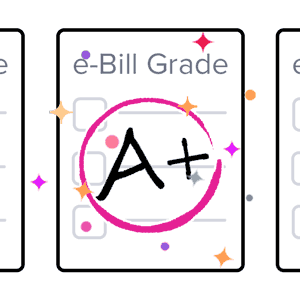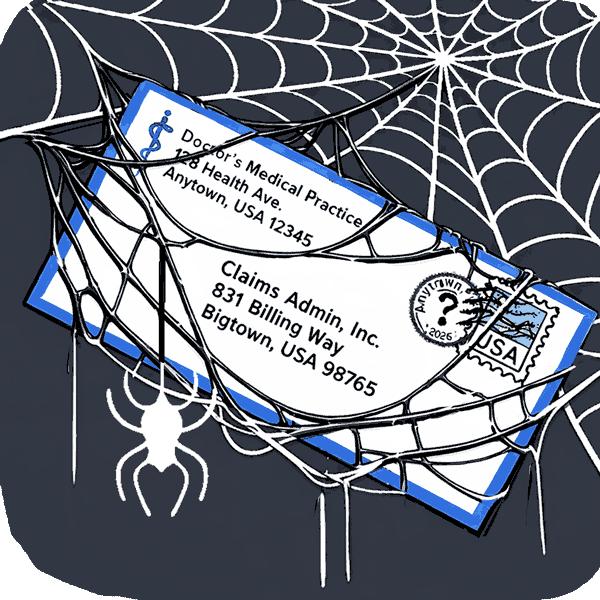CA EDI Compliance: 2022 e-Billing Report Card

For over ten years, California has had a simple legal requirement: all claims administrators must accept electronic bills from providers for the treatment of injured workers. Period.
The reason for the requirement is also simple. e-Billing makes workers’ comp more efficient, less costly, and empowers providers to better meet the needs of employers and injured workers. But many payers simply ignore this requirement — which likely discourages providers from exercising the option to e-bill.
Claims administrator e-billing non-compliance forces providers, who would otherwise choose to e-bill, to send paper bills. Imagine if Medicare (which mandates e-bill submission by providers) randomly required paper bills for patients with birthdays in November, June, and April. Of course, providers would struggle to adopt e-billing.
The facts suggest that providers’ lack of e-billing adoption is due to payer non-compliance with the e-billing mandate, not provider ambivalence towards e-billing.
Providers do not want to bill by snail mail. No practice wants to waste the time and administrative resources necessary to identify mailing addresses, stuff envelopes with their workers’ comp bills and reports, and mail the bills to payers — only to be told the bill is “not on file.” Rinse. Repeat. (Eventually stop treating injured workers.)
California reality dictates that to submit workers’ comp e-bills, providers must maintain workers’ comp billing technology that identifies which payers accept bills electronically and which flout the law.
To keep the realities of e-billing compliance (and lack thereof) squarely in the light for all stakeholders, daisyBill is once again sharing our data. Below, we list the claims administrators that most consistently honored the e-bill acceptance requirement in 2022 — as well as the claims administrators that most brazenly disregarded California law.
The Good News: Top CA Claims Admins by Compliance
First, the 2022 winners.
In 2022, daisyBill providers submitted 1,571,375 California workers’ compensation bills to 295 claims administrators, plus the federal Department of Labor (DOL). The data below list the top twelve e-bill-compliant claims administrators to which daisyBill sent more than 1,000 bills.
All twelve claims administrators listed below maintained 100% e-bill acceptance throughout 2022. These claims administrators (and the DOL) should be congratulated for their superlative performance.
Claims Administrator |
Bill Submission Count |
e-Bill Accepted % |
State Compensation Insurance Fund (CA) |
107,167 |
100.0% |
Gallagher Bassett |
93,807 |
100.0% |
Department of Labor |
21,401 |
100.0% |
Los Angeles County Metropolitan Transit Authority (CA) |
18,475 |
100.0% |
Chubb Group of Insurance Companies |
10,804 |
100.0% |
Barrett Business Services Inc. |
5,900 |
100.0% |
County of San Bernardino (CA) |
2,655 |
100.0% |
City of Los Angeles Department of Water and Power (CA) |
2,338 |
100.0% |
GuideOne Insurance |
1,931 |
100.0% |
Church Mutual Insurance Company |
1,852 |
100.0% |
Garden Grove Unified School District (CA) |
1,619 |
100.0% |
Care West Insurance Company |
1,235 |
100.0% |
The Bad News: Bottom CA Claims Admin by Compliance
And now, the 2022 losers.
The data below list the 31 claims administrators that failed to accept 500 or more e-bills in 2022. This list is sorted in descending order of the count of e-bills NOT accepted.
The data show some claims administrators selectively refused to accept e-bills (e.g., Tristar, Athens, Risico, etc.), while other claims administrators refused 100% of e-bills (e.g., Affirmative, JT2 Integrated Resources, PMA Companies, etc). These claims administrators are flouting California law, and discouraging providers from e-billing (and often, from treating injured workers altogether).
For our clients, daisyBill has implemented technology to circumvent this e-billing non-compliance. To ensure that all our providers’ bills reach their destination, daisyBill maintains parallel e-bill and paper bill submission systems to compensate for the abject failure of the entities below.
Claims Administrator |
Bill Submission Count |
e-Bill NOT Accepted Count |
e-Bill NOT Accepted % |
Tristar Risk Management |
36,144 |
16,460 |
45.5% |
Athens Administrators |
31,742 |
9,118 |
28.7% |
Affirmative |
6,000 |
6,000 |
100.0% |
JT2 Integrated Resources |
2,828 |
2,828 |
100.0% |
Risico Claims Management, Inc. |
2,949 |
2,743 |
93.0% |
PMA Companies |
2,420 |
2,420 |
100.0% |
LWP Claims Solutions |
12,719 |
2,137 |
16.8% |
Travelers |
41,663 |
1,763 |
4.2% |
Acclamation Insurance Management Services |
14,401 |
1,544 |
10.7% |
Packard Claims Administration |
1,453 |
1,453 |
100.0% |
County of Riverside (CA) |
2,371 |
1,285 |
54.2% |
American Claims Management, Inc |
7,055 |
1,157 |
16.4% |
Sentry Insurance |
11,730 |
1,087 |
9.3% |
Elite Claims Management |
3,193 |
950 |
29.8% |
Republic Indemnity |
10,527 |
948 |
9.0% |
ClaimQuest, Inc. |
946 |
946 |
100.0% |
Intercare Holdings Insurance, Inc. |
54,574 |
944 |
1.7% |
Sedgwick Claims Management Services |
289,481 |
928 |
0.3% |
City of Santa Monica (CA) |
878 |
878 |
100.0% |
County of Sacramento (CA) |
859 |
859 |
100.0% |
Berkshire Hathaway Homestate Companies |
66,119 |
842 |
1.3% |
Omaha National Group |
5,069 |
797 |
15.7% |
Cannon Cochran Management Services Inc. |
30,544 |
788 |
2.6% |
Uninsured Employers Benefits Trust Fund N. CA |
695 |
695 |
100.0% |
AmeriTrust Group, Inc. |
3,851 |
671 |
17.4% |
ESIS, Inc. |
50,038 |
661 |
1.3% |
Uninsured Employers Benefits Trust Fund S. CA |
640 |
640 |
100.0% |
Contract Claims Services Inc. |
625 |
625 |
100.0% |
Next Level Administrators |
13,112 |
560 |
4.3% |
Salus |
545 |
545 |
100.0% |
The Cities Group |
531 |
531 |
100.0% |
The 2022 data offer one bright spot: Athens, following our indictment of the Third-Party Administrator (TPA) and subsequent filing of thousands of formal Audit Complaints, got its act together in the final months of 2022. By December, Athens was accepting 99.7% of e-bills — not enough to avoid making the naughty list for the year, but an incredible turnaround worth noting. Keep it up, Athens!
As 2023 unfolds, we will continue to share relevant data revealing the true state of workers’ comp. If some providers hesitate to embrace workers’ comp e-billing, or workers’ comp generally, one reason is clear: payer non-compliance. Why participate in any system where one side is not expected to honor its obligations?
To best meet the needs of injured workers and their employers, providers must be able to rely on a stable system where non-compliance results in consequences. As things stand, providers bear the burden of navigating claims administrators’ failures to follow the law — an unsustainable state of affairs that must change.
daisyBill tracks responses to your bills, appeals, and RFAs — so your practice knows when payers break the rules. Click below to learn more, or request a demonstration.
LEARN MORE
DaisyBill provides content as an insightful service to its readers and clients. It does not offer legal advice and cannot guarantee the accuracy or suitability of its content for a particular purpose.


